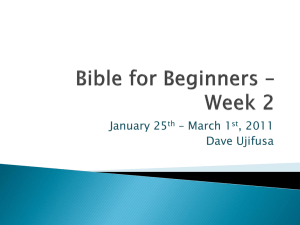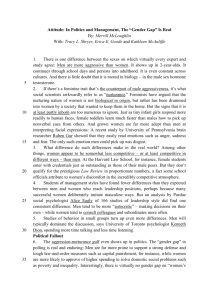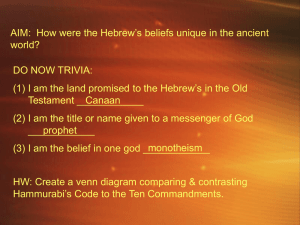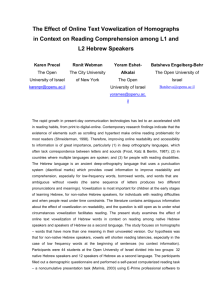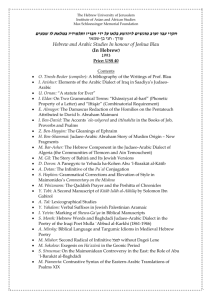Biblical Hebrew E-Magazine - Ancient Hebrew Research Center
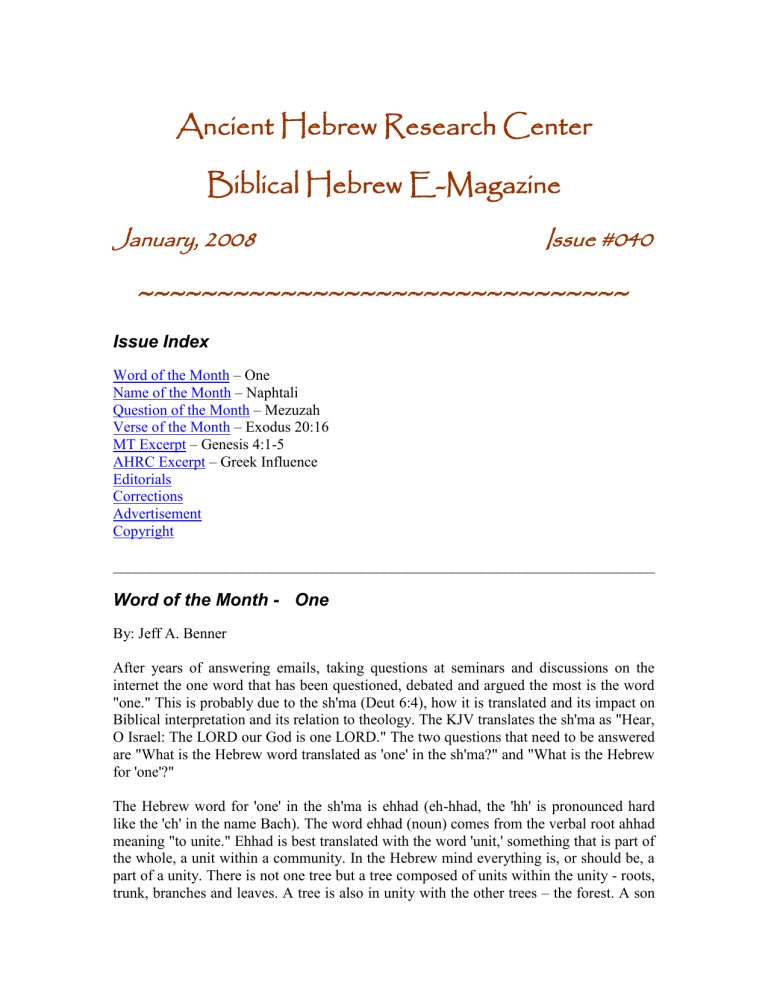
Ancient Hebrew Research Center
Biblical Hebrew E-Magazine
January, 2008 Issue #040
~~~~~~~~~~~~~~~~~~~~~~~~~~~~~~~
Issue Index
Question of the Month – Mezuzah
Verse of the Month – Exodus 20:16
AHRC Excerpt – Greek Influence
________________________________________________________________________
Word of the Month One
By: Jeff A. Benner
After years of answering emails, taking questions at seminars and discussions on the internet the one word that has been questioned, debated and argued the most is the word
"one." This is probably due to the sh'ma (Deut 6:4), how it is translated and its impact on
Biblical interpretation and its relation to theology. The KJV translates the sh'ma as "Hear,
O Israel: The LORD our God is one LORD." The two questions that need to be answered are "What is the Hebrew word translated as 'one' in the sh'ma?" and "What is the Hebrew for 'one'?"
The Hebrew word for 'one' in the sh'ma is ehhad (eh-hhad, the 'hh' is pronounced hard like the 'ch' in the name Bach). The word ehhad (noun) comes from the verbal root ahhad meaning "to unite." Ehhad is best translated with the word 'unit,' something that is part of the whole, a unit within a community. In the Hebrew mind everything is, or should be, a part of a unity. There is not one tree but a tree composed of units within the unity - roots, trunk, branches and leaves. A tree is also in unity with the other trees – the forest. A son
is a unit within the brotherhood. From this we can conclude that the sh'ma is not speaking of Yahweh as a 'one and only' but as a unit of the whole.
A different word, but related to ehhad, is the word yahhiyd (ya-hheed) and is often thought to mean 'one' in the sense of 'one and only." The word yahhiyd comes from the verbal root yahhad meaning "to come together to be united." Yahhad is best translated as
'together,' in the sense of not being separated from the whole (See Genesis 22:6). The word yahhiyd is used for Isaac's son in Genesis 22:2 and is best translated as 'solitary,' something that is not united with the whole such as we can see in the following verse.
"God sets the 'solitary' (yahhiyd) in families" (Psalm 68:6). An 'only' son is a 'solitary' son.
If ehhad means a unit and yahhiyd means solitary, then what is the Hebrew word for 'one' in the sense of a single entity or the number one? In my new book " The Living Words,
Volume 1 " (or see the excerpt at http://thelivingwords.ancient-hebrew.org
– "Unity") I detail the possibility that the Hebrew word 'ashtey' was the original Hebrew word for the number 'one' but was replaced later by the word 'ehhad.' Therefore, within some contexts, the word 'ehhad' means 'a unit from within a unity' but in other cases as 'a one and only.'
________________________________________________________________________
Name of the Month - Naphtali
By: Jeff A. Benner
The next son of Jacob in our series is Naphtali.
And Rachel said, With great wrestlings have I wrestled with my sister, and
I have prevailed: and she called his name Naphtali. Genesis 30:8 (KJV)
The Hebrew word translated as 'wrestlings' in the verse above is 'naphtul' meaning 'to entwine' such as the twisting together of cords to make a rope or to be entwined together through wrestling. The name Naphtali fully means 'my wrestling.'
_______________________________________________________________________
Question of the Month - Mezuzah
By: Jeff A. Benner
Q: Did the Ancient Hebrews use a Mezuzah similar to those used today?
A: The modern Mezuzah is a piece of paper or parchment with Deuteronomy 6:4-9 and
11:13-21 written on it and placed in a box. This box is then attached to the doorpost of the house. This 'Mezuzah' is to fulfill the Torah requirement of Deuteronomy 6:6-9:
And these words, which I command thee this day, shall be in thine heart:
And thou shalt teach them diligently unto thy children, and shalt talk of them when thou sittest in thine house, and when thou walkest by the way, and when thou liest down, and when thou risest up. And thou shalt bind them for a sign upon thine hand, and they shall be as frontlets between thine eyes. And thou shalt write them upon the posts of thy house, and on thy gates.
The first question that needs to be answered is "What are "these words" that are to be taught and written?" According to modern Judaism it is Deuteronomy 6 as they are what is written on the Mezuzah, but I contend that it is the commands given prior to
Deuteronomy 6 – the '10 commandments' found in Deuteronomy 5.
The second question is "Is the modern Mezuzah the correct application of the command in Deuteronomy 6?" If you read the passage above literally, it says that you are to write
"these words' on the "doorposts." The Hebrew word for a doorpost is "mezuzah"(literally a mezuzah is 'not' the paper or the box which are today identified as a mezuzah). The command is not stating that a Mezuzah is to be placed on a doorpost but that "these words" are to be written on the doorpost (the mezuzah).
I am of the opinion that the Ancient Hebrews wrote the 10 commandments directly on their doorposts (Mezuzah).
________________________________________________________________________
Verse of the Month - Exodus 20:16
By: Jeff A. Benner
This is an ongoing look at the 20th chapter of Exodus and the "Ten Commandments" or more literally "ten of the orders."
׃ר ֶק ָׁש ד ֵע ךֲָע ֵר ְב הֶנֲע ַת־אֹל
You shall not bear false witness against your neighbor. (ASV)
אֹל
(lo)
This word negates the following verb.
הֶנֲע ַת
(tah-ah-neh)
The base word is the verb הנע (anah) meaning “to answer” or "testify." The prefix ת identifies the verb tense as imperfect - will testify - and the subject of the verb as second person, masculine, singular - you will testify. Because of the preceding word this would be translated as “you will not testify.”
ךֲָע ֵר ְב
(beh-rey-ah-khah)
The base word is ער (reya) meaning "friend" or "companion." The prefix ב means "in" or
"with" and the suffix ך means "you." All combined, this word means "in your friend."
ד ֵע
(eyd)
This noun means a "witness" or "testimony."
ר ֶק ָׁש
(shah-qehr)
This noun means a "lie" or "deception." When one noun follows another, such as in this case, they are in the construct state. Therefore, these two nouns should be translated as
"testimony of deception."
The following is a literal rendering of this verse from its Hebraic meaning.
You will not testify in your friend a testimony of deception.
In following issues we will continue with this chapter.
________________________________________________________________________
Mechanical Translation Excerpt - Genesis 4:1-5
For details on this new translation see the web site at http://mthb.ancient-hebrew.org
1 and the human had known “Hhawah [Living]” his woman and she conceived and she brought forth “Qayin [Acquired]” and she said, I purchased a man with “YHWH [He exists]”,
2 and she again brought forth his brother “Hevel [Empty]” and “Hevel [Empty]” existed as a feeder of the flocks and “Qayin [Acquired]” existed as a server of the ground,
3 and it came to pass at the conclusion of days, “Qayin [Acquired]” brought from the produce of the ground, a donation to “YHWH [He exists]”,
4 and “Hevel [Empty]”, he also, had brought from the firstborn females of his flocks and from their fat and “YHWH
[He exists]” looked with respect to “Hevel [Empty]” and to his donation, 5 and to “Qayin
[Acquired]” and to his donation he did not look with respect and “Qayin [Acquired]” was much flared up and his face fell,
_______________________________________________________________________
AHRC Website Excerpt – Greek Influence
The following article is the result of a survey I had taken which asked the question "What was the Hebrew name of the Bread-like substance God gave Israel in the wilderness."
It is a provable fact that translations of the Hebrew Bible relied more on the Greek
Septuagint (a 2,000 year old Greek translation of the Tenach/Old Testament) than the
Hebrew Bible itself, dramatically influencing how we read the Hebrew Bible. This is why
we say Moses (Greek Septuagint) instead of Mosheh (Hebrew Bible), Aaron (Greek
Septuagint) instead of Aharon (Hebrew Bible), Eve (Greek Septuagint) instead of Hhava
(Hebrew Bible) and why we say "manna" (the focus of the survey I had taken) instead of its proper Hebrew pronunciation.
In Exodus 16:15 most translations read "...they said one to another, ‘What is it?’" The
King James reads "...they said one to another, It is manna..." In the survey most people agreed the Hebrew name of the bread-like substance God gave Israel in the wilderness was "Manna" with many adding that it means "What is it." Some wrote that the Hebrew was "Man Na" identifying that it was two Hebrew words meaning "What [is] It." So, what does the Hebrew of Exodus 16:15 actually say? It says "Man Hu" which is the
Hebrew words meaning "What is it." Manna (or Mannah or Man Na) does not occur in this verse, not does it occur in Exodus 16:31 which uses the Hebrew word "Man" alone.
If the word Manna does not occur in the Hebrew bible, where does it come from? The only place this word is found is in the Greek Septuagint where the Hebrew word "Man" is written in Greek as "Manna."
What I have found really amazing is that while there is a heavy Greek influence on
Christian translations, this influence has also entered into Judaism as well. Here is the
Jewish Publications Societies (JPS, 1917) translation of Exodus 16:31 - "...Israel called the name thereof Manna..." Why is a Jewish translation of the Hebrew Bible using the word found in the Greek Septuagint for the Hebrew word "Man?" What surprised me through the survey was that the large majority of the Jews who follow Judaism thought the Hebrew word for the bread-like substance was "Manna."
This article is located on the web site at http://www.ancient-hebrew.org/8_greek.html
________________________________________________________________________
Editorials
In your August e-zine, you mentioned an apparent contradiction in the scriptures regarding the sojourning of Israel, whether 400 or 430 years was the correct number.
As a matter of fact, the correct answer should have been that Israel sojourned in Canaan
30 years prior to their sojourn in a strange land, namely Mizrayim. The scripture accurately states that their sojourn in Egypt would be 400 years, and that their total sojourn, counting their 30 year sojourn in Canaan was 430.
The land of Canaan was not a strange land to Israel, for Elohim had given it to Israel as a possession, yet they sojourned through it for that 30 year period. Their permanent stay in the promised land came after their exodus from Egypt; before that, they were only sojourners until the promise was fulfilled.
Now, if you re-read Exodus 12:40, you will notice that it does not say the children of
Israel were in Egypt for 430 years, but that their sojourning - counting 30 years in Canaan
+ 400 in Egypt - was 430 years.
-- Andy Reaume ( www.doctrinaltruth.com)
- - - - - - - - - - - - - - - - - - - - - - - - - - - - - -
The house of Zarah-Judah reigned approx. 130 years as the Hyksos Shepherd Kings over
Egypt after the death of Joseph, until another Pharaoh threatened the Zarah-Judah rulers out of Egypt, where they founded the ancient city-states of Athens, Troy and Rome before migrating westward to Britain and founding New Troy (present day London). It was after Zarah's departure that the children of Israel began to be oppressed by the
Egyptian over-lords, an oppression lasting approx. 200 years (during the last half of the
400 year period of their sojourn, as prophesied). Elohim was preparing a place in Western
Europe - forged by the valiant wars of Zarah-Judah - for the non-Jewish "lost tribes" of
Israel after their release from Assyrian (Germanic) captivity, centuries after the exodus from Egypt. Pharez-Judah's line was also dispersed westward by their Babylonian
(Roman) lords, to live among their "forgotten" brothers - the northern tribes of Israel.
Both houses - the house of Israel and the house of Judah - will return together in the last days to their rightful inheritance, to the land of promise. But by then, only a remnant will be saved from among the millions alive today.
Just an extra adjunct if I may: the sphinx monument in Egypt is a memorial of Zarah-
Judah ruling over the land at that appointed time as the lion king. In Europe today as in ancient times, the red lion is a symbolic representation of Zarah-Judah, while the golden coloured lion is symbolic of Pharez-Judah. Both lines have mingled via marriages and unions of sort, ruling over the affairs of the many nations of Israel and of the world in general. Truly, Abraham's seed possess the world as was prophesied. It is great to know that Elohim rules over the affairs of men, and that nothing escapes predestination. He works His wonders through us toward the world, for good and evil, and all His purposes shall come to pass. He will re-marry Israel whom He divorced, and the prodigal son will once again awaken to His calling. The time of Jacob's trouble is fast approaching, and
Satan will attempt to destroy the seed of Abraham and will nearly succeed, but his plot will be averted by the King of Kings - Yahushua - at His coming.
-- Andy Reaume ( www.doctrinaltruth.com)
- - - - - - - - - - - - - - - - - - - - - - - - - - - - - -
Hi,
About the Word of the Month - Slave
Comparing Ex21:5,6 and De6:4-9 (the Shema),
Exodus 21,5 But if the servant shall plainly say: I love my master, my wife, and my children; I will not go out free; 21,6 then his master shall bring him unto God, and shall
bring him to the door, or unto the door-post; and his master shall bore his ear through with an awl; and he shall serve him for ever.
Deuteronomy 6,4 Hear, O Israel: the LORD our God, the LORD is one. 6,5 And thou shalt love the LORD thy God with all thy heart, and with all thy soul, and with all thy might. 6,6 And these words, which I command thee this day, shall be upon thy heart; 6,7 and thou shalt teach them diligently unto thy children, and shalt talk of them when thou sittest in thy house, and when thou walkest by the way, and when thou liest down, and when thou risest up. 6,8 And thou shalt bind them for a sign upon thy hand, and they shall be for frontlets between thine eyes. 6,9 And thou shalt write them upon the doorposts of thy house, and upon thy gates. [Mechon-Mamre version JPS]
There are a lot of parallels:
- Love for master, wife and children; loving YHWH with heart, soul and might;
- Door or door-posts; and
- Awl; writing instrument.
The ear even is a parallel for the door-posts and gates. The ear is the entrance through which the sacred words pass; in De6, the sacred words are inscribed where those passing through may see them.
The ear is pierced with a sharp stylus; and the door-posts are inscribed upon with a stylus.
Stone tablets were written upon with a wood or metal stylus to which a diamond
(adamantine) or flint shard were attached with a lump of lead solder or hard dopping wax.
This is still done today in lapidary art. (See Job 19:24; Proverbs 3:3; Isaiah 8:1; etc.)
The symbols are highly functional in prophecy, and they all say the same message in various ways -- in love, the willing servant passes by and hears and constantly reads the words of YHWH when he goes from the inner to the outer courts, and back again.
-- JW
- - - - - - - - - - - - - - - - - - - - - - - - - - - - - -
I just saw the question that was in the Hebrew Magazine (which I love to death!!!) that asked: "Why are the years of Israel’s sojourning different in Genesis 15:13 and Exodus
12:40?" And of course, I would LOVE to answer that question.
Actually, the answer to that question is given by the apostle Paul himself in Galatians
3:16-18. He speaks of the covenant made with Abraham, then speaks of the Law going into effect 430 years later. Abraham was 75 years old when this covenant was made . (Ge
12:4,5). When you add up the years: Isaac was born 25 years later, (Ge 21:5); Jacob was born 60 years after that, (Ge 25:26); And Jacob moved to Egypt when he was 130 years old, (Ge 47:9); your sum of years from the covenant to arrival into Egypt is 215 years.
This means the Israelites were in Egypt then for 215 years when the Exodus occurred, then the Law was validated, according to Paul's words to the Galatians.
Also, Genesis 15:13-16, God told Abraham, "You may know for sure that your seed will become an alien resident in a land not theirs, and they will have to serve them, and these will certainly afflict them for four hundred years." Abraham was childless at the time this was spoken so he had to wait for his seed to become 'alien residents in a land not theirs.'
According to Genesis 16:15, 16, Abraham was 86 when Ishmael was born by an Egyptian woman. But the "seed" of the covenant, Isaac, was born when Abraham was 100 years old. (Ge 17:19, 21). On the day that Isaac was weaned, Abraham's Egyptian son, Ishmael, was "poking fun" at him. (Ge 21:8,9). The Hebrew word tsachaq can have a negative connotation. Isaac evidently was 5 years old; Abraham was 105 years old. This was the beginning of the "affliction." And the Exodus occurred 400 years later from that point.
Therefore, Exodus 12:40 says: "And the dwelling of the sons of Israel, who had dwelt in
Egypt, was four hundred and thirty years." The word "who" does not describe "dwelling" but describes "Israel."
So to sum it up, if Abraham crossed the Euphrates at 75 years of age in 1943 BC, then
Ishmael was born in 1932 BC, Isaac was born 1918 BC, and the Exodus was in 1513 BC.
I hope I answered that simply. Believe me, I TRIED!
Go to this site! http://www.angelfire.com/moon/sherrylynnk4/shamalama.html
-- Patrick Ragland
_____________________________________________________________________
Corrections
In the August Issue (#39) I provided the ASV translation of Exodus 20:13-15 as "Thou shall not kill," but should have been "Thou shalt not kill, Thou shalt not commit adultery,
Thou shalt not steal."
_____________________________________________________________________
Advertisments
Hebrew Text and Lexicon of Genesis by Jeff A. Benner, is the Leningrad Hebrew text of the Book of Genesis with an alphabetical lexicon of each Hebrew word of the text. This book is very useful for anyone learning to read Biblical
Hebrew or wanting a more in-depth look at the book of
Genesis.
Additional information and ordering details are available through the bookstore.
( http://www.ancient-hebrew.org/bookstore )
________________________________________________________________________
Copyright © 2008
Jeff A. Benner
Ancient Hebrew Research Center
Please feel free to use, copy or distribute any material within the "Biblical Hebrew E-Magazine" for nonprofit educational purposes only.
________________________________________________________________________

